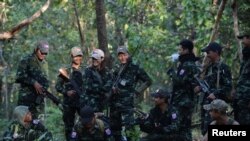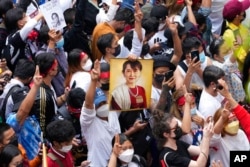Myanmar’s ruling junta expelled Timor-Leste’s charge d’affaires — the island nation’s top diplomat in the country — over Timor Leste President Jose Ramos-Horta’s contact with Myanmar's government in exile.
In July, Ramos-Horta met in Dili, Timor Leste’s capital, with Zin Mar Aung, the shadow National Unity Government’s foreign minister.
Myanmar’s military rulers regard the National Unity Government as a terrorist organization.
“Such irresponsible actions of the government of Timor-Leste are not only harming the bilateral diplomatic relations between the two countries but also encouraging the terrorist group to further committing their violations in Myanmar,” Myanmar’s Ministry of Foreign Affairs said on August 27.
That is misleading.
The People’s Defense Force, a collection of armed groups created or recognized by the National Unity Government, has been accused of bombing government targets and killing members of Myanmar government-aligned forces and alleged government collaborators, among others.
The attacks started after Myanmar’s military violently suppressed protests against its ouster of the country’s democratically-elected government in a February 2021 coup. The U.N.’s Independent Investigative Mechanism for Myanmar accused Myanmar’s military of launching a “widespread and systematic attack against a civilian population.”
No other state has accepted the junta’s designation of the National Unity Government as a terrorist group.
The National Unity Government, in turn, designated Myanmar’s military junta, formally called the State Administrative Council, as a terrorist organization in June 2021, citing its mass killings of civilians and involvement in arbitrary detentions, torture and sexual violence.
According to the U.N.’s Special Rapporteur on the situation of human rights in Myanmar, the State Administrative Council “is not a legitimate government and should not be recognized, or engaged with, as such,” arguing it has “no democratic or constitutional legitimacy” and “lacks effective control of the country.”
The rapporteur called on U.N. member states to recognize the National Unity Government as “the legitimate representatives of the people of Myanmar.”
The European Union has recognized the National Unity Government and the Committee Representing Pyidaungsu Hluttaw — an exiled legislative body comprised of parliamentarians pushed out of Myanmar during the 2021 coup — as “the only legitimate representatives of the democratic wishes of the people of Myanmar.”
Analysts and rights groups note that Myanmar’s junta has long employed a strategy of collective punishment against civilians for their alleged support of armed resistance groups.
They also say the junta has committed war crimes that dwarf in nature and scale the anti-junta forces’ alleged terrorism.
“The military’s strategy is to punish the civilian population for any perceived support of the opposition,” Anthony Davis, an analyst for the Janes group of military publications and an expert on Myanmar’s military, told The New York Times. "It’s about burning villages, bombing villages and forcing the civilian population out of villages.”
The junta has particularly targeted ethnic minority states in Myanmar that are opposed to military rule.
As the junta’s ability to establish control over the country has flagged, it has ratcheted up attacks against civilians.
The Independent Investigative Mechanism for Myanmar, mandated by the United Nations to collect evidence of the most serious international law violations in the country, reported that between July 2022 and June 2023, Myanmar’s military and affiliated militia groups engaged in three types of war crimes “with increasing frequency and brazenness.”
Those crimes were the indiscriminate or disproportionate bombing of civilians, killings of civilians or combatants detained during operations, and the large-scale and intentional burning of civilian dwellings and other civilian buildings.
In July, Volker Turk, the U.N. High Commissioner for Human Rights, said his office had recorded a 33% increase in indiscriminate airstrikes in the first half of 2023 year-on-year, “with rising attacks on civilian targets, including villages, schools, hospitals and places of worship.”
According to the U.N., Russia supplied and maintained jets and helicopters used in those attacks.
“My Office also continues to document repeated violations of the most brutal forms: sexual violence, mass killings, extra-judicial executions, beheadings, dismemberments, and mutilations,” Turk said.
The New York Times reported on July 31 that the junta’s “brutality against civilians” was “escalating.”
For example, on April 11, Myanmar’s military dropped what Human Rights Watch identified as a “thermobaric” munition on the village of Pa Zi Gyi in central Myanmar’s Sagaing Region.
The military claimed it had killed “terrorists” from the People’s Defense Force.
The Washington Post, however, found that at least 25 children were among the 157 people killed.
Sagaing, Myanmar’s historical heartland, has been the site of repeated massacres by junta forces.
Junta forces and affiliated militias have also disproportionately targeted Sagaing with arson attacks.
Data for Myanmar (D4M), an independent organization that has compiled data on arson attacks, reported in August that, since the February 2021 coup, junta forces had torched nearly 75,000 homes in six regions and seven states.
Sagaing region accounted for 77% of all the homes torched.
The National Unity Government has accused the junta of killing at least 1,595 civilians in 144 mass killings between February 2021 and July 2023.
The Assistance Association for Political Prisoners (AAPP), run by Myanmar citizens in exile, said on August 28 that 4,009 people had been killed in the post-coup crackdown.






